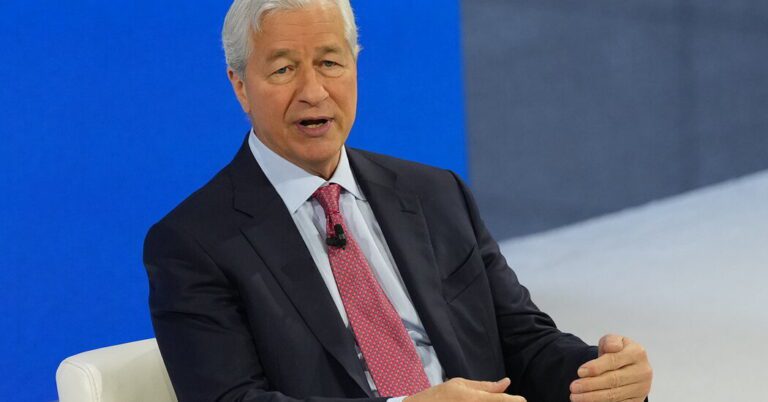
[ad_1]
Jamie Dimon, the chief executive of JPMorgan Chase, on Friday warned of an “unsettling” global landscape, highlighting a cascade of pressures, including war, rising geopolitical tensions and inflation that threaten the economy and could weigh on the performance of the nation’s largest bank.
Mr. Dimon’s remarks, made concurrently with his bank’s quarterly earnings report — which showed weakness in some parts of the business — add to his litany of concerns about the U.S. economy as the Federal Reserve grapples with when or whether to lower interest rates, particularly in light of this week’s hotter-than-expected inflation data.
On a call with reporters on Friday, Mr. Dimon underlined his angst, describing heady financial markets as “too happy.” He said he couldn’t predict whether the economy would enter a recession, but that “the chance of bad outcomes is higher than people think.”
Mr. Dimon is the most prominent bank leader. Not only does JPMorgan have exposure to all corners of the global economy, he’s the only major bank chief still around from the 2008 financial crisis, and his pronouncements are closely followed on Wall Street and in Washington. He was the only head of a major American lender to attend this week’s White House state dinner for Japan’s prime minister.
His gloom, however, has also been consistently at odds with strong financial markets. In late 2022, for instance, he predicted economic bumps and, potentially, a severe recession for the next year; instead, the American economy boomed in 2023.
Indeed, Citigroup’s chief financial officer, Mark Mason, speaking Friday as his own bank reported earnings, had a relatively rosy take. Mr. Mason described the global economy as “resilient” and said that while Citi expected a slowdown in economic growth throughout the year, strong consumer spending and employment data were reasons for optimism.
JPMorgan reported more than $13 billion of profit in the first quarter and nearly $42 billion in revenue, both better than analysts had expected. But it said there had been a drop in deposits as customers sought to invest their money rather than leave it in checking and savings accounts, and it warned of higher expenses in the future. JPMorgan also disclosed an unexpectedly steep fall in its so-called net interest income, a closely watched financial metric that essentially measures how much money it is able to make from lending.
Wells Fargo, the nation’s third-largest bank, on Friday separately reported earnings that also included a drop in that measure. It notched $4.6 billion in quarterly profit, down 7 percent from the same period a year earlier. The bank’s average deposits also fell, and the number of new loans it made declined compared with last year, due in part to its leaders’ moves to reduce mortgage lending.
Shares of both banks were lower in early trading Friday.
Many economists predicted that this year would bring a so-called soft landing, or a gentle easing in growth and inflation that would allow the Federal Reserve to lower interest rates in an orderly fashion.
Now, with little indication of any slowdown, it is unclear whether the central bank will make the three interest rate cuts that officials had predicted for the year. Mr. Dimon has been among the few bank leaders to say they are preparing for the possibility that interest rates will be raised again, a move that would suggest more extreme inflation than is currently being measured.
Mr. Dimon made more extended remarks on the tricky environment in his annual letter to shareholders this week. He lamented, as he had before, that the United States engaged in deficit spending and ticked off a list of complaints about where public and private leaders have fallen short. (“Social media could do more,” he wrote.) Referring to Russia’s invasion of Ukraine and other crises, he wrote that recent events “may very well be creating risks that could eclipse anything since World War II.”
On Friday, he said that the topic on top of his mind was “the future of the free world.”
Emily Flitter contributed to this report.
[ad_2]